Điểm nhấn
-
 Hội thảo “Thực trạng người Việt Nam hồi hương từ Vương quốc Anh giai đoạn 2014 - 2023”
Hội thảo “Thực trạng người Việt Nam hồi hương từ Vương quốc Anh giai đoạn 2014 - 2023”
-
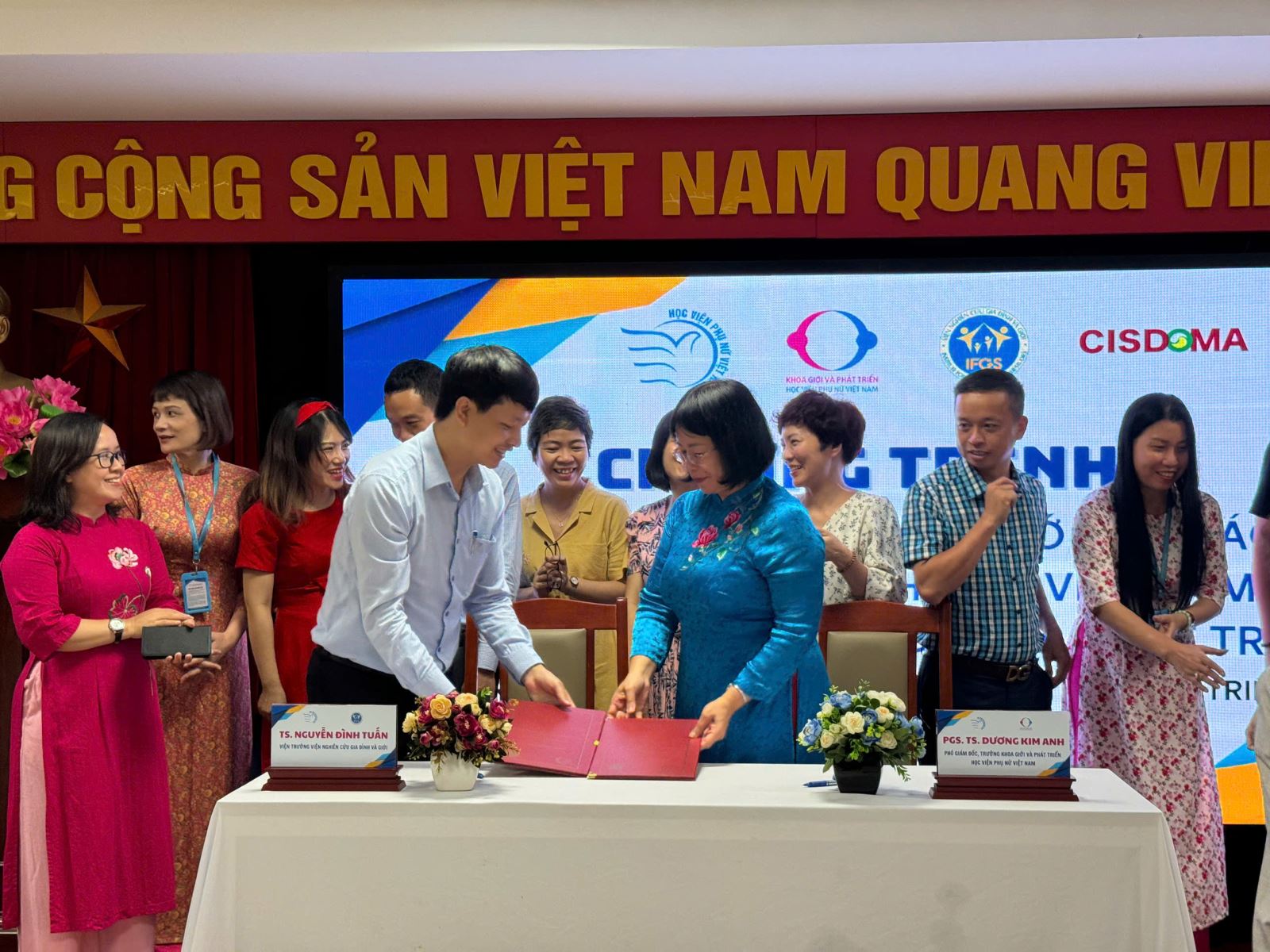 Lễ Ký kết biên bản ghi nhớ hợp tác giữa Học viện Phụ nữ Việt Nam với Viện Nghiên cứu Gia đình và Giới
Lễ Ký kết biên bản ghi nhớ hợp tác giữa Học viện Phụ nữ Việt Nam với Viện Nghiên cứu Gia đình và Giới
-
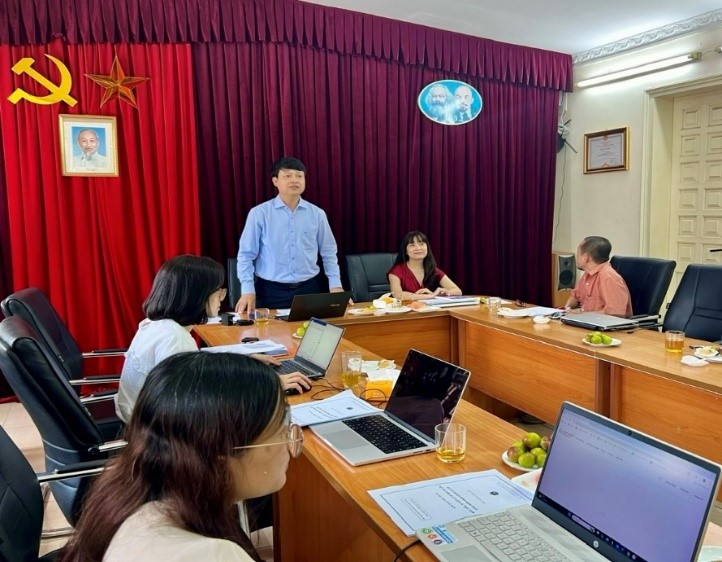 Hội thảo khoa học: "Bộ chỉ số gia đình hạnh phúc: Một số vấn đề lý luận và thực tiễn"
Hội thảo khoa học: "Bộ chỉ số gia đình hạnh phúc: Một số vấn đề lý luận và thực tiễn"
-
 Tọa đàm khoa học "Vận dụng lý thuyết trong nghiên cứu khoa học xã hội"
Tọa đàm khoa học "Vận dụng lý thuyết trong nghiên cứu khoa học xã hội"
-
 Hội nghị Đối thoại giữa Chi ủy, Lãnh đạo viện với đảng viên, viên chức và người lao động Viện nghiên cứu Gia đình và Giới 6 tháng đầu năm 2024
Hội nghị Đối thoại giữa Chi ủy, Lãnh đạo viện với đảng viên, viên chức và người lao động Viện nghiên cứu Gia đình và Giới 6 tháng đầu năm 2024
-
 Chi bộ Viện nghiên cứu Gia đình và Giới tổ chức sinh hoạt chuyên đề: Đoàn kết thống nhất trong Đảng theo tư tưởng Hồ Chí Minh
Chi bộ Viện nghiên cứu Gia đình và Giới tổ chức sinh hoạt chuyên đề: Đoàn kết thống nhất trong Đảng theo tư tưởng Hồ Chí Minh
-
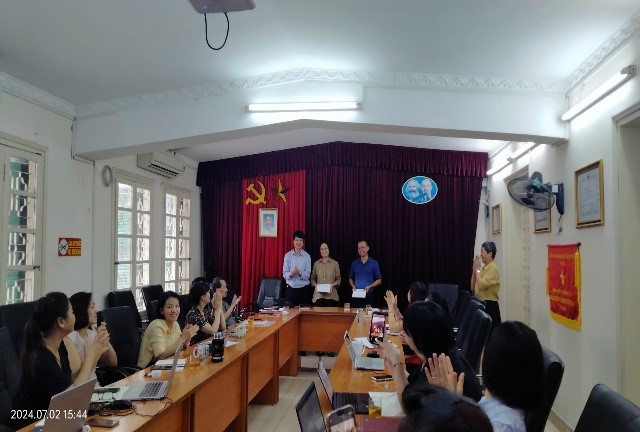 Cuộc thi “Nét đẹp và giá trị gia đình Việt Nam” hưởng ứng Ngày Gia đình Việt Nam 2024
Cuộc thi “Nét đẹp và giá trị gia đình Việt Nam” hưởng ứng Ngày Gia đình Việt Nam 2024
-
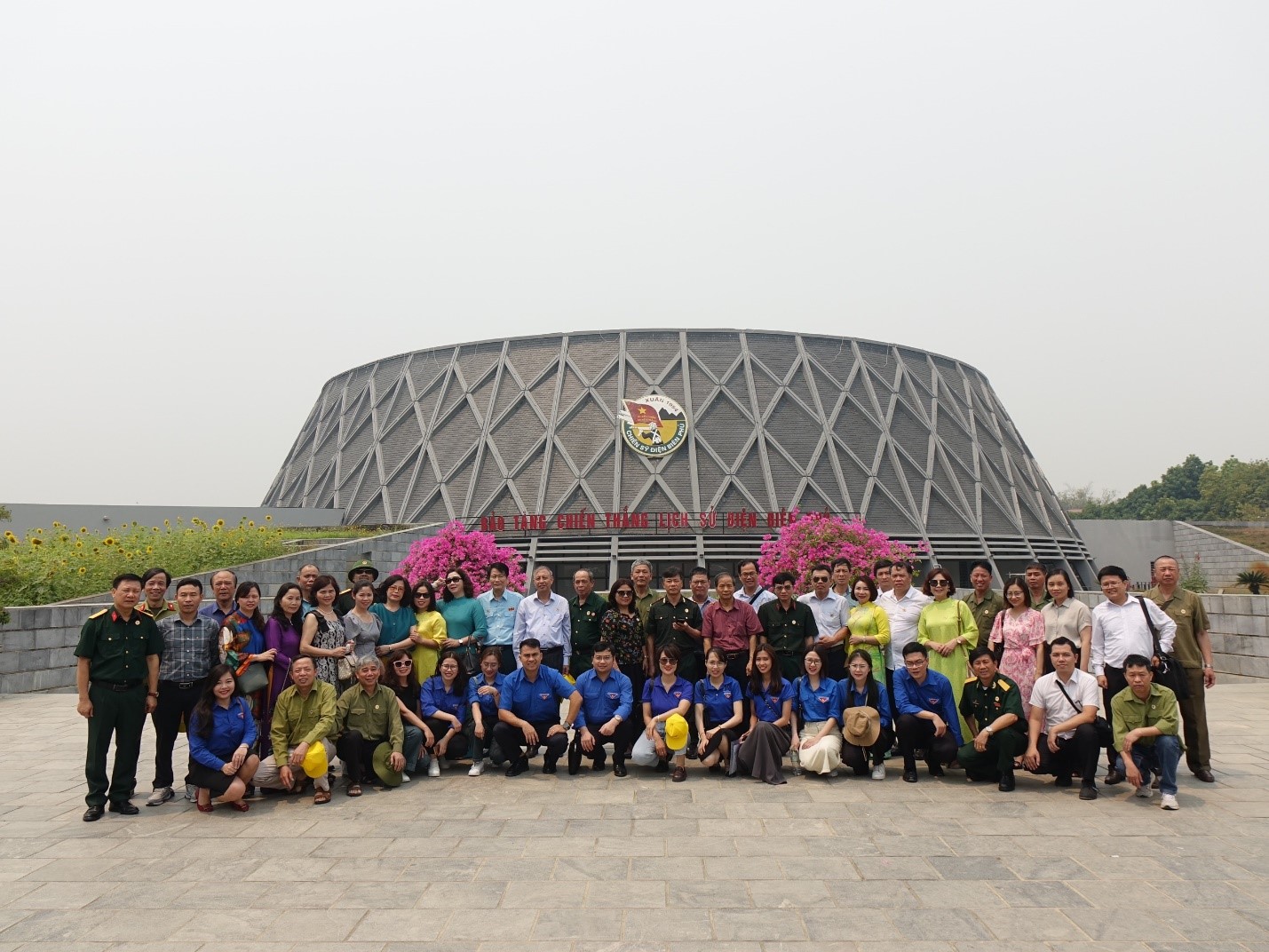 Hội Cựu chiến binh, Đoàn Thanh niên Viện Hàn lâm Khoa học xã hội Việt Nam đi thăm lại chiến trường xưa Điện Biên Phủ
Hội Cựu chiến binh, Đoàn Thanh niên Viện Hàn lâm Khoa học xã hội Việt Nam đi thăm lại chiến trường xưa Điện Biên Phủ
- Tổng mục lục Tạp chí 2023
-
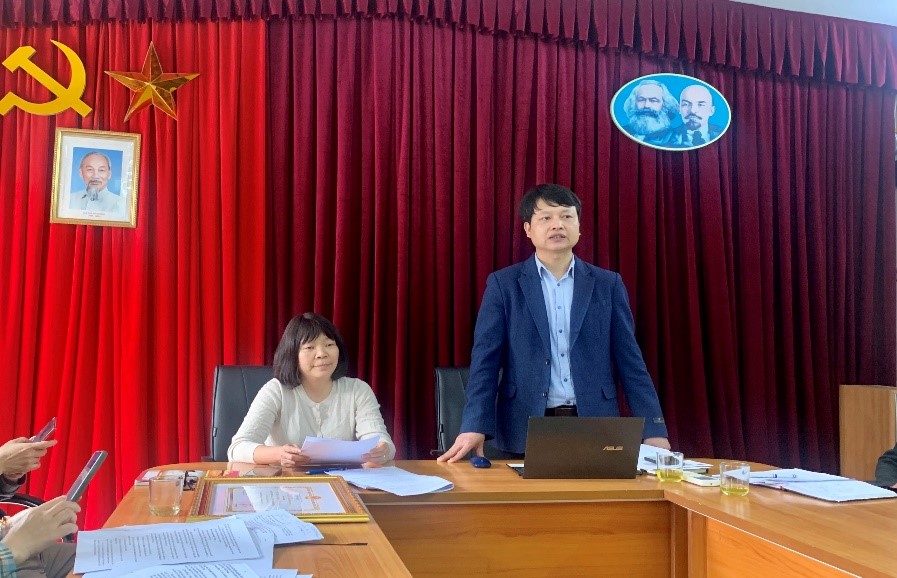 Viện nghiên cứu Gia đình và Giới phát động phong trào thi đua và ký Giao ước thi đua năm 2024
Viện nghiên cứu Gia đình và Giới phát động phong trào thi đua và ký Giao ước thi đua năm 2024
Liên kết web
Số lượt truy cập
23
5407463
Chi tiết tạp chíNo. 2 - 2017
New Director of Institute for Family and Gender Studies Appointed
In the morning of November 16th 2017, at the Institute for Family and Gender Studies headquarter, 27 Tran Xuan Soan, Hai Ba Trung district, Hanoi, Vietnam Academy of Social Sciences (hereinafter referred as the Academy) held a ceremony to announce the appointment of Dr. Tran Thi Minh Thi as the director of the Institute for Family and Gender Studies (IFGS) under Vietnam Academy of Social Sciences.
Attending the ceremony were Prof. Dr. Nguyen Quang Thuan, Party Committee Secretary and President of Vietnam Academy of Social Sciences, Assoc. Prof. Tran Minh Tuan – Head of Personnel Department, and officials, public servants and employees of IFGS.
On behalf of the Academy’s Party Standing Committee and leaderships, Prof. Dr. Nguyen Quang Thuan presented flowers and delivered speech in recognition of the contributions by Prof. Dr. Nguyen Huu Minh, former Director of IFGS to the institute’s stability and development.
The Academy’s President highly appreciated Prof. Dr. Nguyen Huu Minh’s capability, virtues, sense of responsibility in creating professional, united and effective working conditions and wished that in the coming time, as an experienced professional, he would continue practically contributing to the IFGS in its professional work, training and policy advising activities. Units and individuals presented flowers and offered the best wishes and regards to Prof. Dr. Nguyen Huu Minh who sincerely thanked the President of the Academy, his colleagues in the institute for their positive comments and promised to devote all his professional and managerial experience and knowledge to the IFGS’s operation.
Prof. Dr. Nguyen Quang Thuan also handed over the Academy President’s Decision No. 1984/QD-KHXH, dated November 16th 2017, appointing Dr. Tran Thi Minh Thi, senior researcher, Deputy Director of the Institute as the director of the Institute for Family and Gender Studies (IFGS) under Vietnam Academy of Social Sciences for the next 5-year term. Prof. Dr. Nguyen Quang Thuan presented congratulatory flowers and assigned tasks to the newly-appointed Director of the Institute. The President believed in her new position, Dr. Tran Thi Minh Thi would continue the Institute’s tradition and predecessors’ legacies. He hoped that with all the profound knowledge that the newly-appointed Director received from various training courses at home and abroad, she would lead the officials, public servants, state employees and workers to comprehensive and sustainable development and wide and deep international integration.
Speaking at the ceremony, the newly-appointed Director of the Institute for Family and Gender Studies, Dr. Tran Thi Minh thi sincerely thanked the Academy’s Party Standing Committee and leaders for entrusting with new tasks, thanked the officials, public servants and state employees in the Institute for recommending her for the Director’s position. She was well aware of the great honor and responsibility to the leaders of the Academy, preceding generations as well as all the officials and state employees in the Institute in the mixture of opportunities and challenges in the research, training and international cooperation. The Institute for Family and Gender Studies would intensify efforts to strengthen the linkage between fundamental studies and practical summaries, continue developing human resource of high qualification and ethical standards and proactively domestic and international cooperation.
She pledged to use her experience and capability to continue and bring into full play beautiful tradition of the Institute, legacies of preceding generations, maintain a firm position and strong unity, work wholeheartedly, spearhead the innovative research and join hand with leaders, public servants and state employees and other laborers to take the Institute forward. The Director also hoped to receive further support and direction of the Party Standing Committee, leaders and departments of the Academy as well as the entire staff of the Institute to successfully fulfill her assigned tasks and bring the IFGS to a new height.
On this occasion, Dr. Tran Thi Minh Thi has received many congratulations and flowers from the Party Committee and leaders of the Academy, Personnel Department, staff and mass organizations of the IFGS.
Issues in Adolescent Reproductive Health Care in Vietnam: What Could We Do?
Abstract: Issues in adolescent reproductive health (ARH), for example unsafe sex, abortion, RTIs, are not simply health-related matters such as the lack of knowledge and skills in caring and protecting ARH. They are often originated from broader social issues, and once established, they in turns result in not only reproductive health but also more complicated psychological and social consequences. By reviewing various studies on ARH in Vietnam, this paper aims at generalizing remarkable issues in ARH care and its social aspects. Based on that, it suggests some recommendations from social work perspective to improve adolescent reproductive health care in Vietnam, with an emphasis on supporting disadvatanged groups.
Sex Selective Abortion in Vietnam: Practice and Policy
Abstract: Since 2003 the Vietnam government has launched prohibitions forbidding sex determination and sex selective abortions. However, between 2009 and 2014 the SRB increases from 110.6 to 112.2. So, how have public regulations prohibiting sex selective abortions been practiced in Vietnam's health sector? Is there any insufficiency in these regulations? Are the bans effective in stopping sex selective abortion?
This study conducted in 2009. The data include observations; interviews with 35 women seeking ultrasound scans and abortion at an obstetrical and gynecological hospital; interviews with doctors providing the ultrasound and abortion services; and interviews with managers and policy-makers on reproductive health.
In Vietnam, prohibitions forbidding sex determination and sex selective abortion already exist but are not consistently or strictly enforced. To date, the bans do not appear to be effective in stopping sex selection. The loose management and supervision in providing and using reproductive health services as well as commercialized health care have created space for practicing sex determination, followed by sex selective abortion. It is recommended to improve ethic ideals among providers and have broad social measures to improve the status of women.
Abstract: As a result of socio-economic and cultural changes after the renovation, getting married to foreigners has been more acceptable since 1990 in Vietnam. This cross-border marriage has steadily increased over years, especially Vietnam-Taiwan and Vietnam-Korea marriages. By 2013, there were about 50,000 Vietnamese brides living in Korea, and more than 100,000 in Taiwan. From 2013 on, similar numbers of Vietnamese women moved to China with family union visas. The increase in marriage migration raises a number of important issues for the sending places. It has considerable consequences for the make-up of population and other social issues in origin areas. The number of divorced ladies coming back with their children has steadily increased. Their living experiences after divorce in the mother land is also a matter of concern. This paper uses the data from research conducted by University of Social Sciences and Humanities in 2015 in Vinh Long Province, funded by Vietnam National University in HCMC, conducted with 450 households after their daughters got married to foreigners. The study includes 30 in-depth interviews with the returnees and their children, to present the pattern of cross-border marriages in this area as well as their impact on the sending communities. It also tries to discuss the policy implications of the findings and includes recommendations for policy changes.
Unpaid Care Work - Issues and Suggestions for Vietnam
Abstract: Although unpaid care work are vital for people’s well-being and the functioning of the market economy, they remain invisible. Globally, the burden of combining productive and reproductive work has negative consequences on women’s lives, including limiting economic opportunities and power within households. One of the key targets of the Sustainable Development Goal 5 is to “recognize and value unpaid care and domestic work through the provision of public services, infrastructure and social protection policies and the promotion of shared responsibilities within the households and the family as nationally appropriate”. Viet Nam’s National Strategy for Gender Equality 2011-2020 includes a target to reduce women’s time involvement in household duties under its objective to ensure gender equality in family life. Based on the desk review, this discussion paper aims to provide evidences on impacts of unpaid care burden on women’s development and current issues in Viet Nam’s context, thereby, contribute to public debates on policy design in Viet Nam.
Happiness and the Need to Study Happiness in Vietnam
Abstract: Happiness is a universally-accepted socio-cultural value. All 193 United Nations member states, including Vietnam, have adopted a resolution calling for a higher priority to be placed on happiness and established the 20th of March as the annual International Day of Happiness. Across the world, happiness has been an increasingly popular subject of empirical research; however in Vietnam, the subject of happiness remains largely unexplored in academic research. This article focuses on the concept of happiness, cultural differences in happiness, the applications of happiness study, the need for happiness study, and the measurement of happiness among Vietnamese people.

